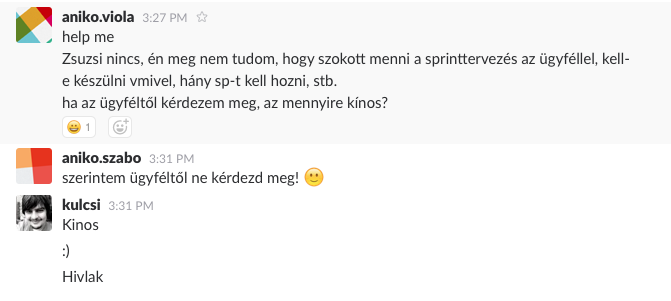
Zsuzsi goes on holiday.
We're talking about eight working days; that's not the world. Moreover, she left the field with her usual precision: for this sprint, tasks were scored and assigned, she informed everyone about pending cases, clients were informed who to contact in her absence.
I became PO for two support projects a month ago. I took on the position with great reluctance, saying I had already done the tasks for the role, it would not be a big challenge. Plus, we have two owners for each project: an account and a PO working on the cases, supporting each other, so I wasn't left with the responsibility.
But in Zsuzsi's absence, I have complete control over the projects; I have to keep everything under control.
I'm not scared. It's about minor improvements, we have a live release scheduled, which I prepared last week, and Zsuzsi will be back for the next sprint launch.
Let's do it!
First day
A live release.
I'm on the 24th letter with a client when I think it's time to ask for help. At this point, the client's trust in us is being damaged. Kulcsi, before he can read anything, looks at me and says: "You always have to stop at the fifth letter." After the fifth letter, the tension starts to build up in both parties: oh, what's happened now, it's still not working, he still doesn't understand, I've explained it for the umpteenth time, and so on. This is the time to signal: we've noticed the problem; we'll work on it for a while; let's come back to it tomorrow.
Read the flow, pick out a sentence ("I'm not fully aware of the expected functionality because I didn't develop this part, but...") and note: "Don't push your uncertainty onto the customer, don't make it perceived, because it can create a sense of uncertainty and tension in the customer too."
Fair enough. Who would have thought that there is a psychology and science to correspondence? They didn't teach you that at university.
Never mind, we'll call, the client reassures us there's no tension, we reassure him it's a temporary condition, and I'll remember today's lesson.
Day two.
I'm more relaxed, the release goes out, the client thanks me for my work, tempers calm down. No further attacks are expected any time soon.
Out of the blue comes the question: Can I call you this afternoon about the sprint planning?
I scratch my head; there was no mention of sprint planning, but of course, call me.
I can't wait.

I'm looking forward to seeing you again. He will attend the meeting.
The customer comes up with a request. As a developer, I don't usually question the client's needs; I immediately start thinking about the scale of the task, what solutions are possible, and when we can implement them in light of this.
Then Kulcsi interjects. Why do you want this? What is the purpose? You could achieve the same goal in other ways.
I blink. He's right.
Here's an accounting question. How does the XY-123 issue now fit into the not-knowing frame, etc.?
I don't understand the question either, I don't know anything about finance, but I remember Zsuzsi saying something about it. I start searching feverishly in my correspondence, while Kulcsi says firmly: We can't answer that now, Zsuzsi can tell us for sure, we'll note the question and forward it to her.
Well, is that possible?
I come out of the meeting thinking.
Day three
I eagerly set to work on two tasks that turned out the client didn't ask for or understood differently than I did. That's why accounts always tell me not to start until the client has agreed...
Day four
I start to get lost in messages.
I wonder why it's good that we write separate letters for each case. Can't we register all the info in one letter!
Day Six
We should pick up issues, test the completed improvements, organize a scoring, plan the next sprint and inform the customers about all this. How do they do all this and on 5-6 projects simultaneously?

Day 7
I'm just playing to survive now.
"Dear XY! Zsuzsi will be back from her vacation on Wednesday; she will attend the next meeting..."
***
Thankfully, Zsuzsi returned on time. It's been an instructive week. I learned my limits, discovered my inexperience, and became convinced of the vital role accounts play in the company.
I am reminded of the story of the ship's mate: the tiny screw feels insignificant on the giant boat, he doesn't wave proudly like the flag, he doesn't steer like the rudder, he doesn't do anything spectacular; he just sits in place.
Share with your friends!